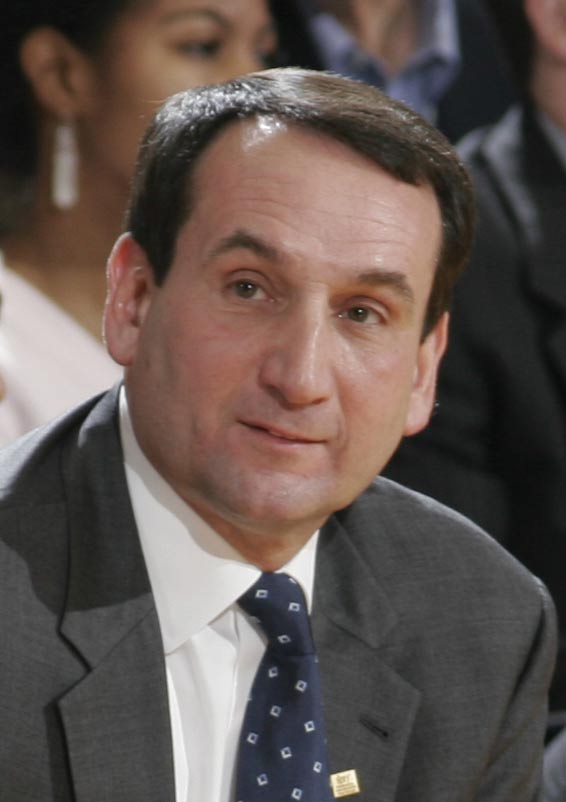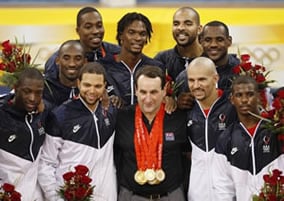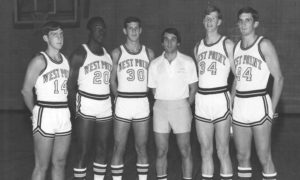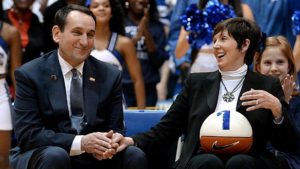
For the first time in history, professional athletes from each country were allowed to participate in the 1992 Olympic Games. Up until that year, Olympic teams were comprised of amateur athletes. This change meant that in 1992, the men’s Olympic basketball team was selected from NBA All-Stars and the team was dubbed “The Dream Team.” As expected, this team won gold, winning their games by an average of 44 points. The 1996 team and the 2000 team also brought home gold. This made sense. The talent in America far exceeded teams from around the world. It was a slam dunk, so to speak. Still, it was clear that other countries were getting better, and in 2004, America failed to win the gold medal in men’s basketball for only the fourth time in Olympic history.
Did America lose because they had inferior talent? This is possible, but most agreed that the NBA superstars were over- confident and lacked the preparation to earn the gold medal. Perhaps the Americans just expected to win based on sheer talent. As individuals, they were stars, but as a team they lacked cohesiveness and chemistry. The bottom line is that Team USA did not play collectively as a team and it cost them. To address the problem, Jerry Colangelo, director of the national team decided that the problem was not the players, but rather the leadership and the approach of Team USA. He said, “When it came right down to it, I had to make a choice. This was the right guy, right time, right place.” Of all the coaches at all levels of basketball, the name at the top of the list was Mike Krzyzewski, the renowned “Coach K” of the Duke Blue Devils. Larry Bird, a member of the original 1992 Dream Team echoed these sentiments, saying, “This is the type of guy we need. After 2004, we needed a wake up call and we got ours.”
 After accepting the position, Coach K’s first order of business was to change the entire approach to the Olympics. He selected players who would make a three-year commitment to the team, not just drop in for the summer of the Olympics. Coach K believes that this commitment is what builds chemistry and trust on a team. He also changed the climate of the team. He spoke to the athletes about core principles of teamwork, sacrifice and trust. “They need to be superstars on their individual NBA teams,” he explained. “But on this team, they’re not—not one of them is that. There’s not one person who should be dominant. The team is dominant.” He brought in wounded U.S. soldiers to remind the players who and what they were representing in the Olympics. The players bought in to this new concept. Kobe Bryant, a player on Team USA said of Coach K, “He’s a great leader. He’s a great communicator. He was very clear on what he wanted from us as individuals to make our collective team greater.” Another player and captain of the team, Jason Kidd said, “Coach K set the tone from day one. Whether it was Kobe scoring 20 or Kobe scoring two, we wanted to have the most points as a team and show the world the right way to play the game.” Behind the leadership of Coach K and a focused Team USA, America once again took home the gold medal in Beijing, China. He was invited back to coach the 2012 Olympic team to another gold. With Coach K at the helm American won three straight Olympic gold medals (2008, 2012 and 2016) and set a standard of excellence.
After accepting the position, Coach K’s first order of business was to change the entire approach to the Olympics. He selected players who would make a three-year commitment to the team, not just drop in for the summer of the Olympics. Coach K believes that this commitment is what builds chemistry and trust on a team. He also changed the climate of the team. He spoke to the athletes about core principles of teamwork, sacrifice and trust. “They need to be superstars on their individual NBA teams,” he explained. “But on this team, they’re not—not one of them is that. There’s not one person who should be dominant. The team is dominant.” He brought in wounded U.S. soldiers to remind the players who and what they were representing in the Olympics. The players bought in to this new concept. Kobe Bryant, a player on Team USA said of Coach K, “He’s a great leader. He’s a great communicator. He was very clear on what he wanted from us as individuals to make our collective team greater.” Another player and captain of the team, Jason Kidd said, “Coach K set the tone from day one. Whether it was Kobe scoring 20 or Kobe scoring two, we wanted to have the most points as a team and show the world the right way to play the game.” Behind the leadership of Coach K and a focused Team USA, America once again took home the gold medal in Beijing, China. He was invited back to coach the 2012 Olympic team to another gold. With Coach K at the helm American won three straight Olympic gold medals (2008, 2012 and 2016) and set a standard of excellence.
When not coaching the men’s Olympic basketball team, Coach K could be found in Durham, North Carolina, coaching the Duke Blue Devils. He was a staple at the university for 42 years and his resume is not too shabby. He led the Blue Devils to five national championships, 13 Final Four appearances, and 13 Atlantic Coast Conference (ACC) regular season championships. To top it all off, he retired at the end of the 2022 season with 1,202 all-time wins, the most of any college basketball coach. Because of his outstanding leadership, Coach K has received National Coach of the Year honors 12 times. In 2001 Duke University extended him a lifetime contract and even named the court at Cameron Indoor Stadium “Coach K Court.”
In his best-selling books, Leading with the Heart and The Gold Standard, Coach K wrote about his leadership principles. The one that he emphasized more than anything else was relationships, “Almost everything in leadership comes back to relationships.” He was careful to use plural pronouns such as “we,” “our,” and “us” instead of “I,” “my,” and “me.” One of his primary goals as a coach was to create a family environment, and his family included more than just the players—it included the entire campus community. Coach K routinely sought advice from people who might be frequently overlooked by other leaders. He relied on his secretary, the school’s sports information director, and the team manager to help him assess the team’s strengths and weaknesses and to point out potential problems. His inclusive approach derived from his philosophy that everybody is equal. Simply having the ability to put a basketball through a hoop does not mean that a player is better than someone who cleans the locker room. The person who performed this task at Cameron Indoor Stadium was a man named D.C. Coach K valued D.C.’s input and asked him to keep an eye on the guys on the team. On more than one occasion, D.C. has told Coach K about a player struggling with a personal issue or having problems in the classroom. By sharing the leadership responsibilities for the team, Coach K built a supportive environment and garnered respect for everyone associated with the program.
 Students at Duke do not have to pay a fee to attend basketball games. In fact, the best seats in the house are reserved for students. There is, however, one catch. Tickets are available to students on a first-come, first-served basis. Given that Cameron Stadium holds only 9,300 fans, and Duke is consistently ranked as one of the best college basketball teams in the country, tickets are in high demand. That means students must wait in line for their tickets. In a tradition unique to Duke, students begin lining up early for each game. In fact, many line up as far in advance as eight weeks before a game! Despite having access to warm, comfortable dorm rooms, eager students choose to live in tents around Cameron Stadium for weeks leading up to certain game days. Up to 15 people are permitted per tent, but University guidelines require that at least one person must remain in the tent during the day and at least eight must sleep in the tent each night. If these conditions are not met, the tent and all its occupants are sent to the back of the line. The name given to this tent city is Krzyzewskiville. Coach K has been known to order pizza and soft drinks for the students in Krzyzewskiville, and sometimes he just stopped by to thank them for their support. Is it any wonder the stadium’s student section is referred to as the “Cameron Crazies”?
Students at Duke do not have to pay a fee to attend basketball games. In fact, the best seats in the house are reserved for students. There is, however, one catch. Tickets are available to students on a first-come, first-served basis. Given that Cameron Stadium holds only 9,300 fans, and Duke is consistently ranked as one of the best college basketball teams in the country, tickets are in high demand. That means students must wait in line for their tickets. In a tradition unique to Duke, students begin lining up early for each game. In fact, many line up as far in advance as eight weeks before a game! Despite having access to warm, comfortable dorm rooms, eager students choose to live in tents around Cameron Stadium for weeks leading up to certain game days. Up to 15 people are permitted per tent, but University guidelines require that at least one person must remain in the tent during the day and at least eight must sleep in the tent each night. If these conditions are not met, the tent and all its occupants are sent to the back of the line. The name given to this tent city is Krzyzewskiville. Coach K has been known to order pizza and soft drinks for the students in Krzyzewskiville, and sometimes he just stopped by to thank them for their support. Is it any wonder the stadium’s student section is referred to as the “Cameron Crazies”?
Before games against Duke’s biggest rivals, Coach K often took time to address the student body. He shared the scouting report with students and gave them assignments to carry out during the game. Most important, he encouraged students to root for Duke and not against the opponents. “Be positive,” he said to the students. “Remember, you are our sixth man—a part of our team. So you should act responsibly.” The students usually fulfilled their end of the bargain. Every game was a sellout and the students remained standing during the entire game. The only time they sat is when the team sat, like during a timeout or at halftime. Coach K was careful to make very little distinction between the players and the students. They were equal in his eyes and part of the supportive family environment at Duke. In 2004, Coach K credited an e-mail from a student as a major influence in his decision to stay at Duke when he was entertaining an offer from the Los Angeles Lakers. That message, and others like it, reminded him that leaving Duke would feel like leaving a family behind.
Mike Krzyzewski’s philosophy of valuing family began with his own parents and siblings while growing up in Chicago. He was born on February 13, 1947, into a hardworking Polish family. His father was an elevator operator at a hotel, while his mother cleaned houses for a living. Throughout his childhood, Coach K says he cannot remember his parents missing a single day of work. The same work ethic was demanded of Mike and his older brother, Bill. Mike never missed a day of school, and as an adult he went 15 years without missing a single practice at Duke. The Krzyzewski family had very little money, but somehow they managed to put two boys through Catholic school. “I never even thought about us being poor,” Coach K remembers, even though the family did not own a house or a car. What they did have at the Krzyzewski household was a lot of love and pride. Coach K says that his parents set a solid foundation for him. In particular, he praises his mother for helping him become the person he is today. In a touching tribute to her, he once wrote, “When people ask me where I learned commitment, I tell them I learned it from you. When they ask me about unconditional support, I learned it from you. Not being afraid to fail? From you.”
 In high school, Mike was a solid point guard for the basketball team and was offered an opportunity to play for Coach Bob Knight at West Point, the service academy for the U.S. Army. From Coach Knight he learned about preparation, organization, and the Xs and Os of basketball. “Bob Knight had a big influence on me,” he says. “He’s a brilliant man, an outstanding coach.” When Mike’s father died unexpectedly during his senior year at West Point, Coach Knight attended the funeral and mourned alongside his family for several days.
In high school, Mike was a solid point guard for the basketball team and was offered an opportunity to play for Coach Bob Knight at West Point, the service academy for the U.S. Army. From Coach Knight he learned about preparation, organization, and the Xs and Os of basketball. “Bob Knight had a big influence on me,” he says. “He’s a brilliant man, an outstanding coach.” When Mike’s father died unexpectedly during his senior year at West Point, Coach Knight attended the funeral and mourned alongside his family for several days.
West Point demanded excellence from each student. Krzyzewski seemed to thrive in such a challenging environment. He understood that every cadet essentially majors in leadership during his or her four years at West Point. The school endorses a strict honor code that reads, “A cadet will not lie, cheat or steal—or tolerate those who do.” A cadet was only allowed to respond to a question with one of three responses: “Yes, sir,” “No, sir,” or “No excuse, sir.” West Point reinforced values such as discipline, honor and honesty—traits that are now an integral part of Coach K’s leadership philosophy at Duke.
After graduation, Krzyzewski was commissioned as an officer and served in the Army from 1969 to 1974. After leaving the military, he served a short stint as Bob Knight’s graduate assistant at Indiana University. In 1975, based on a strong recommendation from Coach Knight and a stellar interview, Krzyzewski was named the head coach at West Point. In five years at the helm, he compiled a modest record of 73-59. This record and his strong leadership qualities were enough to turn a few heads at Duke University. On May 4, 1980, Krzyzewski became the head basketball coach at Duke.
Mike Krzyzewski came to be called Coach K because of the difficulty many people had in pronouncing his name (Sha-shef- ski). The name Coach K is now commonly associated with words such as respect, tradition, excellence, and integrity. However, Krzyzewski didn’t really become Coach K until his fourth season at Duke. In his first three years, the Blue Devils managed to win only 38 games and endured two losing seasons. Critics launched relentless attacks, and many prominent Duke athletic boosters wanted to fire the unknown coach with the unpronounceable name. However, Coach K continued to believe in himself and stuck to his core principles. He knew that a coach is only as good as his players and staff, so his first objective was to surround himself with assistant coaches, staff, and players with outstanding character. Of recruiting players, he said, “We search for good kids with strong character—not necessarily kids with great talent who can play, but great individuals who are willing to be part of a team and are coachable.” No matter how much talent a player has, Coach K did not offer him a scholarship if he was rude or disrespectful. Coach K paid close attention to the way a recruit demonstrated respect for his parents. He freely admitted, “If a young man rolls his eyes when his mother asks me a question, I’m not sure I’m going to offer him a scholarship.” He’s been around enough to know that if a student had not learned to respect authority at home, he was not likely to respect other authority figures when he got to college.
Once Coach K assembled his staff and players, he worked hard to establish a group identity. He did this by communicating in a direct and honest manner. One of the first statements he made to his players each year reflected this straightforward approach. “We have only one rule here,” he said. “Don’t do anything that’s detrimental to yourself. Because if it’s detrimental to you, it’ll be detrimental to our program and to Duke University.” He also made sure that each player understood his “fair, but not equal” policy. Coach K refused to make promises about which players will be in the starting lineup and who gets playing time. Each player had the opportunity to earn playing time based on merit and performance. To promise playing time to any one player would have been detrimental to the entire team. This policy built trust because team members knew that Coach K did not play favorites.
Another facet of Coach K’s leadership style was keeping things simple. He initiated the following handshake deal with each player: “I’m going to give you 100 percent. In return, I expect you to graduate.” Coach K’s main objective was to help his student- athletes walk away from Duke with a college diploma. To reinforce this focus on academics, he stressed the importance of time management. Players were expected to maintain a balance between school and basketball. Each player received a personal date book and was encouraged to map out the entire semester in advance, paying special attention to important exams and due dates for class projects. Finally, Coach K stressed academic integrity. He made it clear that the worst thing a student-athlete can do is cheat.
One way that Coach K built team unity was by creating shared goals. Because each team was unique, each team set unique goals. These shared goals did not have anything to do with winning a specific number of games. Coach K believed it was much more important to set a standard of excellence. “My hunger is not for success, it was for excellence,” he explained. “Because when you attain excellence, success just naturally follows.” In other words, winning games and championships was a byproduct of striving to do your best every single day. Given Duke’s impressive record, people were often surprised that Coach K was not consumed with winning and losing. In fact, after losing the 1999 National Championship game to Connecticut, he said, “Losing a basketball game could never break my heart.” If every Division 1A school set a goal of winning the national championship, only one team would be successful each year. Instead Coach K focused on urging his players to improve every day and play to their potential. “If I teach them well, winning games will be a natural result,” he said. “If my goal had to be only winning games, I wouldn’t be a coach.”
To further enhance team unity, Coach K fostered a supportive environment among teammates. At the beginning of the season, he handed out a list with everyone’s phone number and encouraged players to carry it with them at all times. “Whenever you’re in harm’s way, make a call. If it’s two o’clock in the morning and you’re in trouble, someone on this card will help you.” He also followed up this encouragement with a word to the wise. “When there’s a chance to make a mistake, remember that you’re part of our family. And remember that whatever happens to you, happens to us.” Statements like this built team pride and fostered personal responsibility.
Building supportive relationships based on respect took time. However, once those relationships were in place, Coach K did not hesitate to give honest feedback to his players. As a coach, nothing is more important than being able to communicate openly and honestly with a player at a given moment. “Fellas, I am the truth,” he said. “At any time, I can and will tell you where you stand and how you’re doing. I’ll tell you what you’re doing right and I’ll tell you when you’re screwing up.” If he was successful in establishing a trusting environment, players responded positively to his direct approach. Coach K reminded us that leadership isn’t just about “I love you” and “Let’s hold hands and skip.” Sometimes it required statements like, “Get your rear in gear” and “What the hell are you doing?” As you might expect from a West Point graduate, discipline was an essential part of his success. Coach K said he didn’t understand how discipline had come to have such a negative connotation. “Discipline is doing what you are supposed to do in the best possible manner at the time you are supposed to do it,” he said. “And that’s not such a bad thing.” He held his players to the highest standards and was very demanding. In the organized chaos that is basketball, a leader needed to get his players to perform at a moment’s notice.
Also indicative of Coach K’s leadership style was his reaction after the final buzzer sounded against Kentucky. Instead of getting caught up in the hysteria that immediately erupted, he instinctively knew that he had another job to do. He ran over to the Kentucky player situated closest to him. He wrapped his arms around Richie Farmer and tried to console him. In victory and defeat, Coach K never fails to act with class and dignity.
Few teams have been able to match Duke’s consistent level of success under the leadership of Coach K. His simple formula of preparation, communication, hard work, practice, and focus built a dynasty at Duke. There was little doubt that he is the driving force behind the reputation Duke basketball has enjoyed for the last quarter century. Former player Christian Laettner agreed. “Coach K has been the one constant excellent thing behind Duke basketball,” he said. In a sports world that regularly shows signs of moral decay, Coach K is a shining example of dignity and honesty. He ran a clean program and talked at length about tradition, pride, and character. It is not surprising that 15 of his former assistant coaches went on to become successful head coaches at other Division I universities.
 With his strong character and leadership skills, Coach K has been equally successful off the court. In 2019 he and his wife, Mickie, celebrated their 50th wedding anniversary. Together they have raised three wonderful daughters. Coach K also gives generously of his time to the community. He serves as chairman of the Duke Children’s Miracle Network Telethon and has helped to raise millions of dollars for the Jimmy V Foundation, named in honor of his former colleague at North Carolina State University. To honor his mother, he founded the Emily Krzyzewski Family Center, which provides services to needy families in Durham. The entire Krzyzewski family is involved in campaigns to keep kids in school and off drugs.
With his strong character and leadership skills, Coach K has been equally successful off the court. In 2019 he and his wife, Mickie, celebrated their 50th wedding anniversary. Together they have raised three wonderful daughters. Coach K also gives generously of his time to the community. He serves as chairman of the Duke Children’s Miracle Network Telethon and has helped to raise millions of dollars for the Jimmy V Foundation, named in honor of his former colleague at North Carolina State University. To honor his mother, he founded the Emily Krzyzewski Family Center, which provides services to needy families in Durham. The entire Krzyzewski family is involved in campaigns to keep kids in school and off drugs.
Coach K’s leadership principles are not just applicable to coaching. Business leaders and CEOs from across the country have applied his strategies in corporate America. Several university professors require students to read his book on leadership to prepare them for success in school and the business world. Longtime ESPN basketball analyst Dick Vitale had this to say about Coach K: “Mike Krzyzewski has become the most dominant coaching force in all of college basketball. The numbers don’t shock me and they will continue to grow, as he is a complete leader in every way. He is a master motivator, teacher, communicator, and genuine solid gold Hall of Famer.” There are several other qualities that make Coach K an outstanding leader. First, Coach K is willing to take responsibility for his actions. He regularly admits his mistakes, apologizes for his errors, and takes corrective steps to make things right. Coach K once said, “When you are the CEO of your own company, I want you to remember that you should still clean up your own mess.” As the leader of his team, he nurtured caring relationships and created a family environment on the team and at the university. The basketball family needed rebuilding each year as some players graduate or move on to the pros, yet he was able to successfully lead the team through that difficult transition each year. Because Coach K put such a strong emphasis on relationships, he had the uncanny ability to read his players and know whether they needed a pat on the back or a kick in the rear. He was also wise enough to know that he could always improve. With a continued emphasis on getting better, he consistently learned new strategies to make him a better leader. And finally, Coach K had the courage to stick to his convictions. He once said, “Courage gives a leader the ability to stand straight and not sway no matter which way the wind blows.” Because of his courage, he was able to make tough decisions in a split second and live with the outcome—win, lose, or draw.
While most of you will never become a college basketball coach, all of you will take on leadership responsibilities at some point in your life. Simply becoming a parent will put you in a leadership position. Some of you will be responsible for leading employees at work, while others will take on leadership roles in the community. Even in high school, coaches expect players to become leaders on and off the field. Teachers want students to lead by example—study hard, follow the rules, and help other students when they need it. Remember that when you’re with a group of friends and are confronted with an ethical dilemma, you can show courage by doing the right thing. In all of these situations, it is better to lead by virtue than follow the crowd.

I know how to be a good leader
Mike Krzyzewski was a really good basketba cach in my opinion,